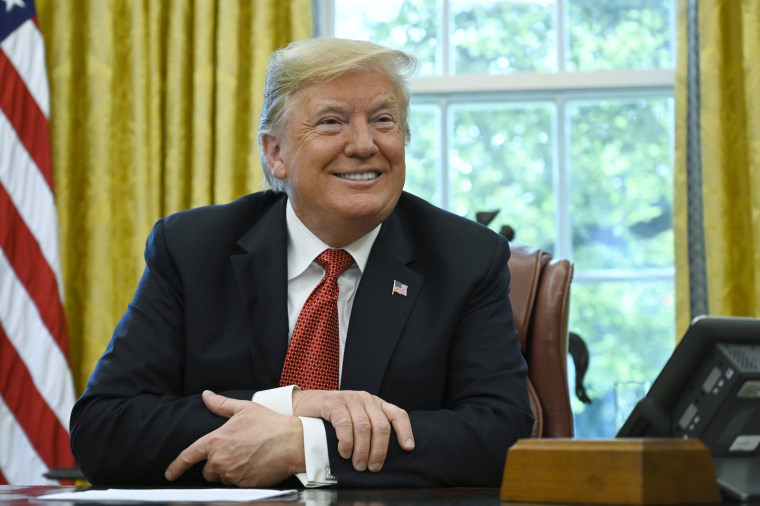WASHINGTON — On the heels of a new Treasury Department report showing a 17 percent rise in the annual federal budget deficit, President Donald Trump said Wednesday that he was asking his Cabinet to propose major belt-tightening.
"We’re going to be asking for a 5 percent cut from every secretary," Trump told reporters, adding "if not more," just before a Cabinet meeting when he actually sat down with his lieutenants a few minutes later.
Trump appeared to give at least a partial reprieve to the Defense Department, which is currently funded at $716 billion, saying its budget "will probably be $700 billion."
It is highly unlikely that members of Congress would agree to an across-the-board reduction in federal spending of that magnitude, which hasn't happened since the Eisenhower administration, according to an NBC review of annual federal outlays.
The yawning deficit has become an increasingly hot political issue in the midterms, with Democrats hammering Republicans for talking tough about fiscal responsibility while expanding the deficit in the nearly two years Trump has been in office.
"To me, it's absolutely hypocritical that we would have someone stand on stage, talk about fiscal responsibility after adding $1.9 trillion to the deficit," Abigail Spanberger, the Democratic candidate who is trying to unseat Rep. Dave Brat, R-Va., said in a debate this week.
Senate Majority Leader Mitch McConnell, R-Ky., told Bloomberg in an interview Tuesday that the real budgeting problem is entitlement programs. Trump promised when he campaigned for president that he would not touch Medicare, Social Security and Medicaid, but since taking office, has proposed major cuts to Medicare and Medicaid.
"It’s disappointing, but it’s not a Republican problem,” McConnell said of the deficits in his Bloomberg interview. “It’s a bipartisan problem: unwillingness to address the real drivers of the debt by doing anything to adjust those programs to the demographics of America in the future.”
On Wednesday, Trump said Democrats had forced his hand to spend more on domestic programs than he wanted in exchange for a massive increase in Pentagon funding.
"I had to do that in order to get the $700 and the $716 billion, those numbers have never been heard of before," he said of defense spending, despite the fact that President Barack Obama signed into law a bill authorizing even higher levels of Pentagon spending. "I had to give the Democrats, I call it 'waste money,' and things that I would have approved, but we had to do that in order to get the votes because we don't have enough Republican votes to do this without them."
The Treasury Department reported this week that the federal deficit for the fiscal year ending Sept. 30 was $779 billion, up from $666 billion the year before. The biggest single factor in the ballooning difference between spending and revenue is the loss of cash from corporate income taxes, which fell from $297 billion to $205 billion after the implementation of Trump's signature tax cut.
Trump's budget proposal for the next fiscal year, setting requests to Congress for each department, will be unveiled early next year. Lawmakers will then write their own spending bills, which the president can sign or veto.
